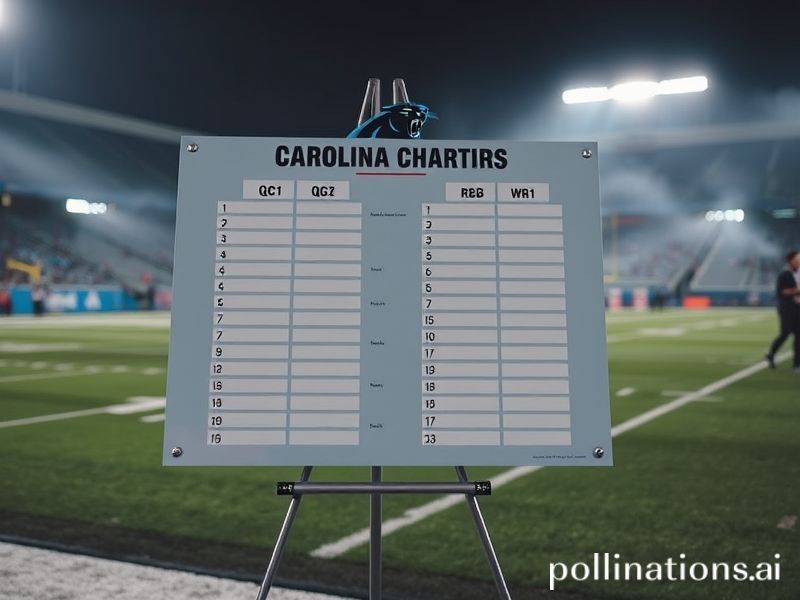Panthers Depth Chart: A Geopolitical Fable Written in Shoulder Pads and Passive Voice
Carolina Panthers Depth Chart: The Geopolitical Playbook Hidden Between the Hashmarks
By “Vlad the Impaler of Sports Bureaucracy,” Dave’s Locker Global Affairs Desk
The Panthers’ freshly minted depth chart dropped this week like a classified cable from the U.S. embassy in a midsize petro-state—full of euphemisms, passive voice, and the quiet understanding that someone, somewhere, is about to be quietly disappeared. Bryce Young sits atop the quarterback hierarchy, which is less a coronation than a provisional governorship in a nation everyone keeps calling “post-conflict” even though the bombs are still falling. The international community nods politely: yes, the kid has the arm talent; yes, the offensive line resembles a UN peacekeeping unit with expired rations; yes, the weapons around him are about as reliable as a Russian field hospital.
Look beyond Bank of America Stadium and you’ll see the Panthers roster as a living UN Security Council debate. At running back, Miles Sanders and Chuba Hubbard form a coalition government that promises “power-sharing” but will almost certainly dissolve into factional infighting once the red-zone carries get scarce. Their committee approach mirrors the current European energy strategy: lots of earnest press conferences, very little actual gas in the tank. Meanwhile, rookie Jonathon Brooks looms like a charismatic opposition leader studying abroad—returning from an ACL tear the way emerging economies return from IMF restructuring: technically solvent, spiritually scarred.
The receiving corps offers its own tragicomic geopolitics. Adam Thielen, ageless as a Swiss bank account, lines up as WR1, flanked by the ever-intriguing Diontae Johnson—an export from Pittsburgh whose career arc resembles a developing nation discovering it can’t actually pay for that Chinese-built port. Terrace Marshall Jr. and Jonathan Mingo occupy the contested borderlands, the kind of territory mapmakers label “disputed” and diplomats pretend not to notice. Somewhere in the slot, rookie Xavier Legette waits like a Special Forces sleeper cell, activated only when the play-call sheet resembles a color revolution.
On defense, the Panthers have adopted the classic small-state survival tactic: invest disproportionately in elite pass rush and hope nobody notices the secondary is held together by barter agreements and wishful thinking. Derrick Brown anchors the interior like a regional hegemon who just discovered everyone else’s navy is made of rubber ducks. Outside, Jadeveon Clowney and D.J. Wonnum rotate like mercenary pilots whose contracts specify “no night missions.” Behind them, the cornerback room—featuring Jaycee Horn, the talented but chronically unavailable sovereign—mirrors a Balkan monarchy: glorious history, questionable succession planning.
The linebacker corps, meanwhile, is the Belt-and-Road Initiative in cleats: Shaq Thompson and Josey Jewell promise connectivity across the middle, but the terms are opaque and the tolls keep changing. In the event of injury, the depth drops off faster than crypto adoption in an inflationary basket-case economy. Dave Canales, the new head coach, speaks in the soothing cadences of a World Bank consultant: culture change, sustainable growth, measurable KPIs. Translation: we’re going to run the ball until morale improves, or until the bond market revolts.
International bookmakers, ever the cold realists, currently price Carolina at roughly the same odds as a cease-fire in the Caucasus. Yet the true intrigue lies in the global supply chains feeding this roster: Samoan long-snappers, Canadian kickers, German developmental linemen on practice squads—human capital flowing like LNG tankers dodging Houthi drones. Somewhere in Davos, a consultant is already pitching “Panthers Depth Chart Optimization” as an ESG-compliant investment thesis.
Conclusion: The Panthers’ depth chart is more than a football document; it’s a fragile multilateral accord drafted on cocktail napkins, signed in disappearing ink. Like any international agreement, it will hold exactly as long as the major stakeholders remain healthy, solvent, and uninterested in a coup. When the inevitable attrition arrives—hamstrings, egos, waiver wires—the rest of the planet will watch with the same detached sympathy we reserve for any small republic discovering that sovereignty is mostly a marketing slogan. Kickoff can’t come soon enough; the world loves a good controlled implosion, preferably in 4K with British commentary.







